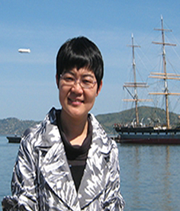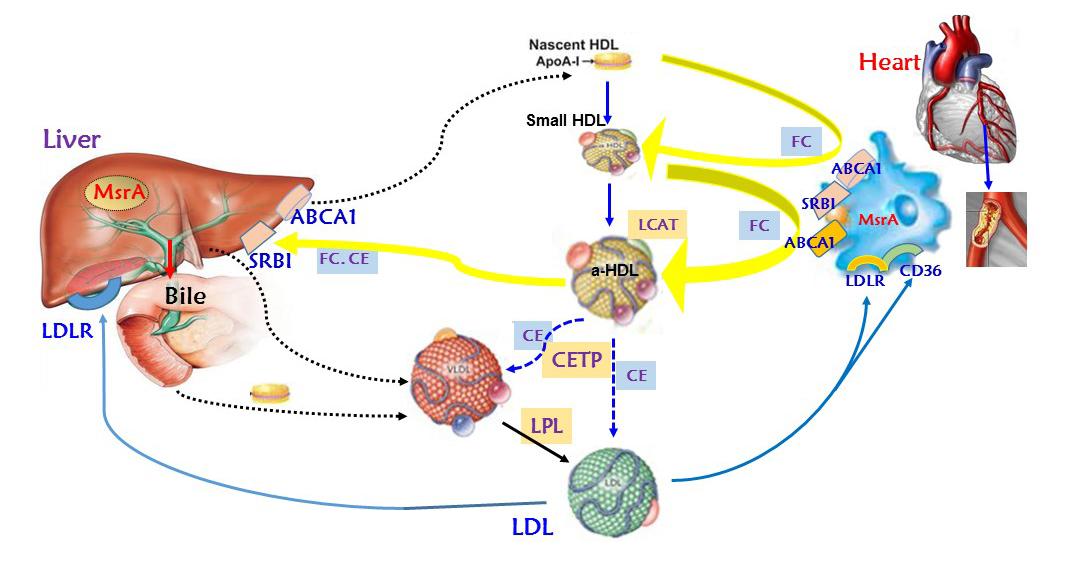
Hong Yu, M.D,PH.D.
E-mail Address: yu.hong@whu.edu.cn
Office Address: Building No.2, DongHu Road 185#, Wuhan, Hubei, 430071
Position: Professor
Affiliation: Department of Biochemistry and Molecular Biology
Research interests / Specialties: Lipoprotein modify- cation and anti-oxidative enzymes in atherosclerosis
Education and Training
Medical Degree, 1987-1992 Hubei Medical University, Wuhan, China
Ph.D., 1994-1999 Wuhan University School of Medicine, Wuhan, China
Post-doctoral training 1, 2001-2002 Faculty of Sciences, Nancy 1 University, France
Post-doctoral training 2, 2003-2005 Dept. of Cardiology, Vanderbilt University Medical Center, USA
Research Description
My research is to investigate the molecular mechanisms, the prevention and therapy of atherosclerosis.
The original focus of my lab was the relationship of lipoproteins and atherosclerosis, including the action of LDL, Lp(a) and HDL in the development of atherosclerosis. In recent study, using lipoproteomics methods and gene knockout mouse model, we found dysfunctional HDL was formed and played a important role in atherogenesis by alteration of protein composition in HDL particles during the process of inflammation and oxidative stress. We explored a detection assay of serum paraoxonase 1 activity, possible application as a biomarker of cardiovascular diseases. We also want to screen out the effective drugs or bioactive peptides for the the prevention and therapy of atherosclerosis.
Methionine sulfoxide reductase A (MsrA), a specific enzyme that converts methionine-S-sulfoxide to methionine, plays an important role in the regulation of protein function and the maintenance of redox homeostasis. We also investigate the impact of MsrA overexpression in specific tissues on lipid metabolism and atherosclerosis in apoE or SRBI deficient mice, to explore the mechanism that how MsrA works and reduces atherosclerosis.

Publication list
1. YU H, Fan D, Du F, Shang L, Wu Y, Pan Y, Cao J, Li XM. (2014) The preparation method of a recombinant apolipoprotein E mimic peptide and application. China's State Intellectual Property Office. CN201110185560.5.
2. Zhou C, Cao J, Shang L, Tong C, Hu H, Wang H, Fan D, Yu H. (2013) Reduced paraoxonase 1 activity as a marker for severe coronary artery disease. Dis Markers. 35(2),97-103.
3. YU H, Zheng W, Zheng YL, Li XM, Hu HL, Shen D, Zhou CY. (2011) A method for determining serum activity of PON1 and its application. China's State Intellectual Property Office. CN200810197195.8.
4. Zhao W, Du F, Zhang M, Sun S, Yu H, Fan D. A new recombinant human apolipoprotein E mimetic peptide with high-density lipoprotein binding and function enhancing activity. Exp Biol Med. 2011;236(12):1468-1476.
5. YU H, Zhou CY, Li Y, Cao J, Li XM. (2010) Effect of scavenger receptor class BI on high-density lipoprotein structure and function. Arterioscler Thromb Vasc Biol 30:pp e204.
6. Yu H, Wang Z, Li M, Li XM, Wu JZ, He CY. (2007) Repair of oxidative low density lipoprotein and high density lipoprotein by recombinant human methionine sulfoxide reductase A. Arterioscler Thromb Vasc Biol. 27(5): pp e58.
7. Yancey PG, Yu H, Linton MF, Fazio S. (2007) A pathway-dependent on apoE, apoAI, and ABCA1 determines formation of buoyant high-density lipoprotein by macrophage foam cells. Arterioscler Thromb Vasc Biol 27(5):1123-1131.
8. Yancey PG, Jerome WG, Yu H, Griffin EE, Cox BE, Babaev VR, Fazio S, Linton MF. (2007) Severely altered cholesterol homeostasis in macrophages lacking apoE and SR-BI. J Lipid Res. 48(5):1140-1149.
9. Yu H, Zhang WW, Yancey PG, Koury MJ, Zhang YM, Fazio S, Linton MF. (2006) Macrophage apolipoprotein E reduces atherosclerosis and prevents premature death in apolipoprotein E and scavenger receptor class BI double knockout mice. Arterioscler Thromb Vasc Biol. 26(1): 150-156.
10. Yu H (subeditor). (2013) Medical molecular biology. (First Edition). Beijing: Science Press. ISBN 978-7-03-037955-9.
11. Yu Hong, Huang XinXiang (Chief editors). (2008) Experimental manual in medical biochemistry. (First Edition) Wuhan University Publishing House. ISBN 978-7-307-06534-5.


